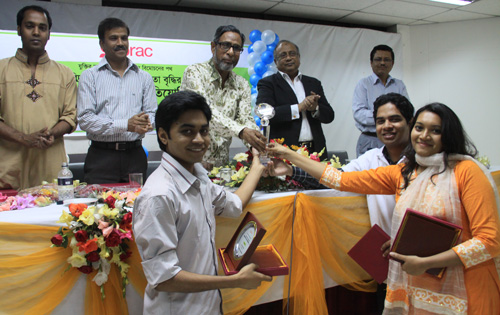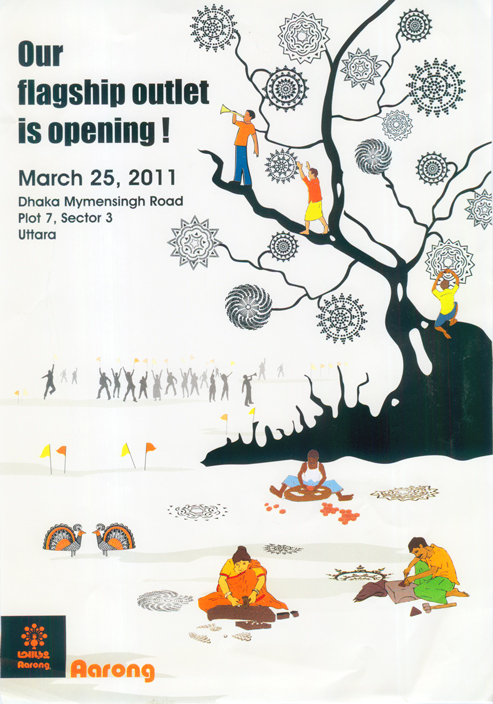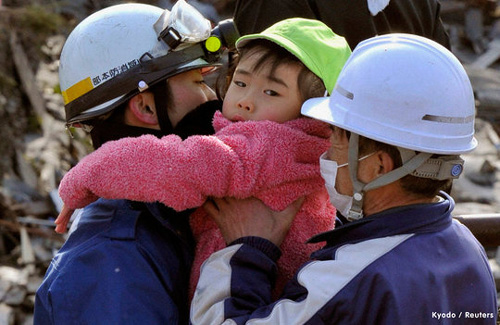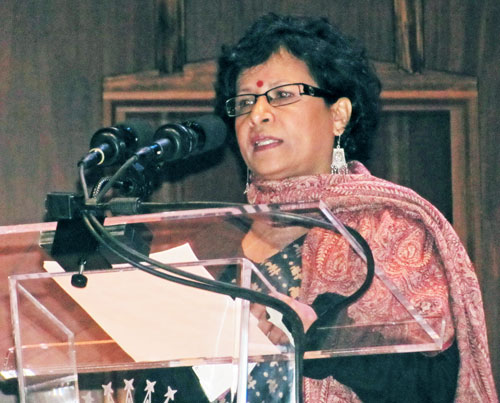
English (963)
Children categories
BRAC Development Institute holds talk about coping with economic crisis
29 March 2011, Dhaka. BRAC Development Institute (BDI) hosted a talk titled Coping with Economic Crisis: Evidence from Bangladesh and Elsewhere by Dr. Naomi Hossain, Research Fellow at the Institute of Development Studies (IDS), Sussex, on Sunday, 27 March, at BRAC University. Dr. Hossain is a political sociologist specialising in the politics of poverty and pro-poor public services.
This presentation summarised findings from qualitative community-level research on the effects of the global food, fuel and financial crises on the lives of poor people in Bangladesh, Kenya, Jamaica, Yemen, Zambia and the UK between 2009 and 2011. It explored the nature of the impacts on local economies and everyday lives, on the coping responses people have adopted in a range of locations and their likely longer term consequences, and on the sources of support poor people have been able to draw on in coping with global economic shocks over which they - and their governments - lack direct control.
The discussion suggested that the poor did not directly correlate their crisis with the global shocks; rather they were always in crisis. The presentation also focused on a lot of positive aspects of Bangladesh which has improved conditions from the past such as better infrastructure and better communication. Political issues contributing to the crisis, policies, the effects of well being and social reproduction during crisis and the responses of people were also discussed.
Engaging the youth: Addressing extreme poverty

22 March 2011, Dhaka. BRAC Advocacy Unit organised the ‘Inter University Debate Competition 2011’ on extreme poverty with the slogan ‘Juktir Aloke Khuji Daridro Bimochoner Poth.’ It was held from March 16 to March 20, 2011 at Shaheed Nurul Amin Khan (Memorial) Multipurpose Hall, BIAM Foundation, New Eskaton, Dhaka.
Our Advocacy Unit seeks to mobilise and raise awareness among youth towards the issue of extreme poverty. We organise quizzes, seminar and debates from grassroots to national level to address the issue. We have already reached 2.17 million school and college students. Now we have taken a step forward in engaging the university students. As future decision makers it is important for them to be aware of the ultra poor regions of the country.
The topic of the final debate was “Proper allocation of budget is the best means of alleviating poverty.” United international University (UIU) won the competition and Jagannath University was adjudged runners-up beating 14 other renowned universities of the country. Md. Riad Hossain from UIU was adjudged Best Speaker.
Dr. AAMS Arefin Siddique, Vice Chancellor of Dhaka University inaugurated the opening ceremony on March 16, 2011. M. Hafizuddin Khan, Chairman of Transparency International Bangladesh (TIB) and Former Advisor of Caretaker Government of Bangladesh were present as the Chief Guest. Muhammad A. (Rumee) Ali, Managing Director, Enterprises & Investments, BRAC graced the closing ceremony as the Chair. Dr. Asif Nazrul, Professor, Department of Law, University of Dhaka, and Sk. Mojibul Huq, Manager of BRAC Advocacy Unit was present as the special guests in the occasion.
The members of Youth Forum for Poverty Alleviation & Development (YFPAD)’ immensely helped us in organising and making the event a success. We strongly believe that engaging the youth in such national issues will bring about positive changes in the future.
International Conference on Entrepreneurship and Development
23 March 2011, Dhaka. Entrepreneurship lies at the heart of the development process. Micro-enterprises are now recognised as key means of generating employment and increasing productivity amongst the poorest segments of the society. In view of this perspective BRAC, IGC(International Growth Centre of London School of Economics), and iiG(Improving Institutions for Pro-poor Growth of Oxford University) are going to organise a two-day International Conference on Entrepreneurship and Development: Experience, Practices and Policies on 27-28 March 2011 at BRAC Centre Inn in Dhaka, Bangladesh. The conference will focus on evaluations of current programmes designed to promote entrepreneurship in order to transform the economic lives of the poor. Central to this discussion will be an evaluation of the BRAC ultra poor programme that aims to transfer assets and business skills to the very poor. This programme is being implemented on a wide scale in Bangladesh and its being replicated in a growing number of developing countries. Recent results suggest that it has the potential to become a major tool in the global fight against poverty. The ultra poor model will be discussed in-depth, providing specific insights for policymakers looking replicate its success in other countries. Other presentations will provide new ideas on how constraints on entrepreneurship at the micro-enterprise level can be relaxed, particularly in the areas of training and access to credit.
The conference will also focus on policies to promote entrepreneurship and productivity improvements in larger firms. Presentations will discuss frontier knowledge on how state-level policies, firm capabilities, and trade interact to promote industrial development. There will be a particular focus on how trade policies can engender industrial development and on how the capabilities of firms to innovate and become more productive can be enhanced.
The outcome of the conference will be particularly relevant for developing countries targeting manufacturing and service sector expansion as a means of promoting economic growth, and there will be ample space dedicated to promoting dialogue and exchange of ideas.
Discussion: Government spending on poverty reduction
24 March 2011, Dhaka. BRAC and Centre for Policy Dialogue (CPD) jointly hosted a discussion on “Resources for the Ultra Poor in the National Budget: How Much? How Effective?” on March 23, 2011 at the BRAC Centre Inn Auditorium.
The main objectives of the dialogue were to provide a set of recommendations to increase the efficacy of fiscal measures and public service delivery to the ultra poor, to enhance implementation of existing pro poor policies and identify future policy priority areas for reducing ultra poor in Bangladesh.
Dr. Muhammad Abdur Razzaque, Minister for Food, Disaster Management and Relief was the Chief Guest of the discussion.
Click here to read more: http://www.thedailystar.net/newDesign/news-details.php?nid=178896
Aarong to launch flagship - country's largest store

24 March 2011, Dhaka. Aarong, the country’s leading fashion and lifestyle brand, will open its flagship store on the Dhaka-Mymensingh Road in Sector 3, Uttara on March 25, 2011. At 36,000 sq. ft., the outlet is currently the country’s biggest retail store. Aarong, an enterprise of BRAC, supports the livelihoods of approximately 65,000 rural artisans, of whom 85% are women.
Now in its 32nd year of operation, Aarong began conceptualising the design and building of its flagship store five years ago, in an effort to consolidate its brand image and present itself on a platform of global standards. The flagship store therefore aims to fully capture the Aarong brand and act as a projection of the brand’s positioning.
Every aspect of design, starting with the customised plans for the building to internal layout and decor, has been made to fit international retail industry standards. Visual merchandising elements inside the outlet have been professionally designed following scientific guidelines. Nakshikantha has been chosen as the overall theme for the store, to reflect Aarong’s pioneering role in the revival of this unique Bangladeshi craft.
Spanning the north wall of the building is Aarong’s Tree of Life – in which Aarong’s story is interwoven with the many thousands of stories of the family of artisans. The network of roots and branches of the tree is in fact an image of the rivers of Bangladesh. The motifs that form the tree use unique Nakshi Kantha patterns shaped from natural elements - metal, wood, clay and leather - indigenous to the work of our artisans. The outlet features six levels, each of which highlights one or more of these elements, with dedicated segments for clothing, accessories, leather and metal, books and stationery, toys, household products and much more. New features introduced include an exhibition gallery, a floor dedicated to exclusive product offering, a premium customer lounge and a newly-branded Aarong café in the flagship store.
The outlet will be inaugurated by Sir Fazle Hasan Abed, Founder & Chairperson, BRAC, Muhammad A. (Rumee) Ali, Managing Director, BRAC Enterprises and Tamara Abed, Director, Aarong. Senior officials from Aarong and BRAC will also be present.
Microcredit Summit lauds BRAC
16 March 2011, Dhaka. BRAC in Bangladesh received a certificate of appreciation from Microcredit Summit Campaign (a project of RESULTS Educational Fund). The certificate was presented in appreciation of BRAC’s commitment to the Summit’s goals.
The Microcredit Summit Campaign launched the State of the Microcredit Summit Campaign Report 2011 on March 7, 2011 in Washington, D.C. According to the report, more than 128 million of the world’s poorest families received a microloan in 2009- an all time high. The certificate is a validation of BRAC’s role in this achievement.
BRAC is an active member of the Microcredit Summit Campaign.
Praying for Japan
19 March 2011, Dhaka. As you all know by now, Japan was hit by a 9.0 magnitude earthquake, one of the largest earthquakes ever recorded, on Friday, 11th March, 2011. It also triggered a massive 23 foot (7 meter) ferocious tsunami killing thousands of people, as it swept away boats, houses, and cars, while widespread fires burnt out of control. The earthquake was followed by more than 50 aftershocks so far, many of them more than magnitude 6.0, and reaching up to Hawaii and other US west-coast areas. 
Photo Copyright © Kyodo/Reuters
We join the Japanese in prayer and in sympathy at the losses suffered by its people.
BRAC celebrates International Women’s Day with Storytelling Platform Launch
8 March 2011. On the occasion of the centenary of International Women’s Day on March 8th, BRAC – the largest non-profit in the developing world – joins the global celebration with the launch of Courage in the Heart, an online platform highlighting the stories of amazing women who experienced transformational change. BRAC will also participate in Join me at the Bridge, a collaboration of Women for Women International and Google to celebrate women’s achievements.
In honor of International Women’s Day, Google selected BRAC to be highlighted for its impactful work on behalf of women from a list of thousands of organizations. “I think Google picked BRAC because of our track record in touching the lives of some 138 million women and their families. By helping girls to get educated, we help them realize their dreams. When girls fly, the whole world soars.,” says Susan Davis, President & CEO of BRAC USA.
Courage in the Heart (http://www.brac.net/courageintheheart) – also slated to launch on March 8th – is an online storytelling platform that features the stories of women in rural Bangladesh who are changing the fabric of society by shifting the consensus about the role of women. Courage in the Heart creators Annie Escobar and Patricia Schneidewind traveled to Bangladesh in 2010 to profile the lives of women who have transformed their lives through BRAC’s pioneering programs.
On the launch, Escobar says:
“Courage in the Heart is meant to build solidarity in the fight for women’s empowerment. We hope to create ‘BRAC ambassadors’ by connecting people in the United States to BRAC’s work and further its effort to empower people in situations of poverty, illiteracy, disease and social injustice.”
This platform shares the accounts of women like Rupa, a young woman in Bangladesh, who after being widowed at fifteen changed her life by becoming a community advocate through BRAC’s Human Rights and Legal Services program. Rupa says of her transformation: "before, I was not aware of the legal system, but now I teach a lot of people about the law."
One additional story will be released each week for six weeks following the launch of Courage in the Heart.
To raise awareness of International Women’s Day, Google has launched a marketing campaign intended to drive awareness of women’s achievements by highlighting incredible women organizations that work in the field of economic security, education, empowerment, equality and leadership, health, and safety and the security of women. BRAC was selected to be highlighted from hundreds of organizations for its impactful work educating women.
About BRAC:
BRAC is a global development organization dedicated to alleviating poverty by empowering the poor to bring about change in their own lives. BRAC’s holistic approach aims to achieve large scale, positive changes through economic and social programs that enable women and men to realize their potential. BRAC was launched in Bangladesh in 1972 and today reaches more than 138 million people in Africa and Asia through its programs that address poverty by providing micro-loans, self-employment opportunities, health services, education and legal and human rights services.
Dr. Afsana receives "Woman of Distinction Award 2011"
01 March 2011, Dhaka. Dr. Kaosar Afsana, Associate Director of BRAC Health Programme, has received the " Woman of Distinction Award 2011" from the NGO Committee of the Status of Women, New York in recognition of her leadership in developing countries for empowering women through education, training, science and technology. This event took place in New York on February 22, 2011. Dr. Afsana was invited as a guest speaker to deliver a speech on using mobile technology for empowering women on February 21, 2011 on Consultation Day at the NGO CSW, New York.

Dr. Afsana speaking on Consultation Day at the NGO CSW, New York
Dr. Afsana has been working at BRAC for over 18 years. She is an MD with MPH from Harvard and PhD from Edith Cowan University, Australia.
Currently, she is heading two significant projects of BRAC on maternal, newborn and child health in urban slums and rural districts of Bangladesh and involved in many different activities with BRAC including strategic directions, policy-making and programmatic decisions.
BRAC chairperson recognised in the first ever “Women Deliver 100” list

07 March 2011, Dhaka. In celebration of the 100th anniversary of International Women’s Day, Women Deliver, a global advocacy organisation, announced the “Women Deliver 100” - their list of the hundred most inspiring people who have delivered for girls and women. This list recognises women and men, both prominent and lesser known, who have committed themselves to improving the lives of girls and women around the world.
BRAC founder and chairperson Fazle Hasan Abed is one of the honourees in the list for lifting millions out of poverty throughout Asia and Africa- –particularly women. Abed recognised early on that empowering girls and women is central to alleviating poverty, and women have always provided the backbone of BRAC’s organisation – 98 percent of the borrowers in our microfinance programmes and more than 95 percent of our volunteers are women.
The honourees derive from the fields of health, human rights, politics, economics, education, journalism, and philanthropy, and represent a great diversity of geographic and cultural backgrounds. The 100 honourees were selected from among hundreds of potentials and feature some of the most intrepid, committed, and results-driven people in the world.
For more details visit http://www.womendeliver.org/
Photo Credit: www.womendeliver.org
Join the world’s biggest family




